"Use Social Media as a tool for Evangelization,” CBCP President
In an exclusive interview with Radio Veritas Asia, the President of the Catholic Bishops’ Conference of the Philippines (CBCP), Bishop Pablo Virgilio David, discussed the importance of digital media in mission and evangelization, for making God's Word available to all.
He highlighted social media as a "perfect opportunity for evangelization," stating that many Christians have profiles on social media and the church will not be able to reach them if digital technology is not utilized.
“It's not about building your personal fame or popularity. It's about making the Word of God accessible to people,” said Bishop David.
As the President of the CBCP, Bishop David talked about nine pastoral priorities for the occasion of 500 years of Christianity in the Philippines, and how these religious priorities have become part of ministerial planning all over the country.
On asking about implementing the FABC’s Triple Dialogue (with religions, cultures, and the poor) in his diocese, he said, "the most prominent is the dialogue with the poor. And it was mainly for that reason that I established what I call mission stations. The mission stations are our effort to make the Church more present among the poorest of the poor.”
Regarding Christianity in the Philippines in the post-Conciliar era, he remarked that it was deeply influenced by the Second Vatican Council and Pope Francis' advocacy for church reforms.
"I could only explain his ideas about synodality and his efforts to emphasize communion, participation, and mission by saying that he was rooted in the Second Vatican Council," Bishop David said.
In this Second part of the Interview, in addition to discussing the Filipino Church of the post-colonial and post-Conciliar periods, Bishop David emphasized the significance of digital technology as an evangelization platform for the church's mission.
Part 1 of the Interview was published earlier:
Watch the Video of Part 1 of the Interview: An Interview with Bishop David of Kalookan, Philippines (Part 1)
Read the transcript of Part 1 of the Interview: “My main task in the Church is to Evangelize,” Bishop David of Kalookan
Read the full transcript of the second part of the interview below.
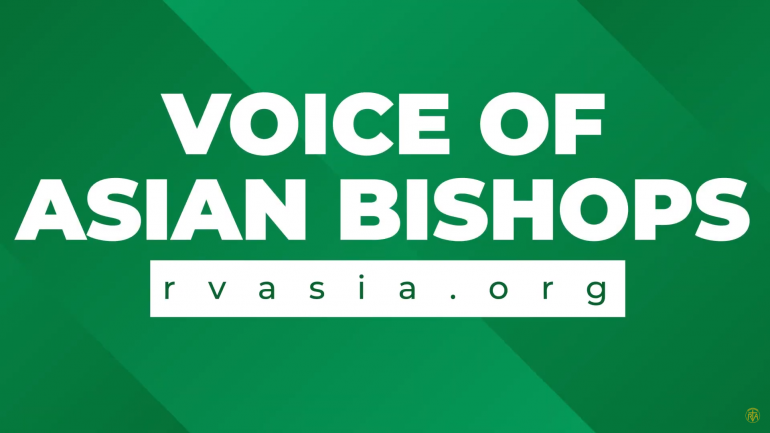
An Interview with Bishop David of Kalookan (Part 2)
by Father Kasmir Nema from Radio Veritas Asia
Kasmir Nema: In 2011, though you were not the president then, CBCP set up nine different pastoral priorities related to 500 years of Christianity in the Philippines. So, I guess my question is given these different priorities every year, and it's already been completed from Faith, Laity, Poor, and Mission, in 2021/2022, do you think the dioceses and parishes in the Philippines have implemented well on these pastoral priorities?
Bishop David:
Well, we had to engage ourselves in the research work to be able to find that out.
When we celebrated the 20th anniversary of the Second Plenary Council, we conducted research about the impact of PCP II on diocesan pastoral planning. And you know that, of course, if we're a conference of bishops, we usually ask the member bishops in the conference to submit to the library and the archives of the Catholic Bishops Conference of the Philippines, copies of pastoral plans or anything that they decree in their own dioceses.
And this would give us an idea of what's happening in the dioceses to be able to keep track. So, what I did was we partnered with Catholic universities, with research centers, and through this research, we tried to find out if PCP II, the Second Plenary Council of the Philippines, which was our first real attempt to own the reform of the Church in the Second Vatican Council, was making an impact in the dioceses and in the parishes in different parts of the country. And we were surprised. Yes. Well, of course, our sources were mainly plans. To what degree the plans had been implemented is also another question, another issue altogether.
But we hope that the ten-year preparation for 2021, you know, that 2021, which is the 30th anniversary of PCP to coincided also with the 500 years of the arrival of Christianity in the Philippines and coincided also with the synod of the synodality, the launching of the synod of the synodality by Pope Francis. And well, of course, now that we have some data and the data came from the synod of the synodality, what to do about the data in order to, you know, because that was basically a consultation, what do you do about the data that you got from the consultation? What do you intend to implement from these that will come out in pastoral planning? And I hear that most dioceses are already gearing for a new round of pastoral planning, basically founded on the result of the consultation from the synod on Synodality.
Now, the Catholic Bishops Conference of the Philippines also raised the question,
Is it or is it not opportune to call for a third plenary Council of the Philippines? And, well, we're still waiting until after the release of the Apostolic Exhortation by the Holy Father, Pope Francis, because we thought it was premature to answer the questions. Premature in the sense that, first of all, we want to compare the results of the consultations in the synod on synodality with PCP II. Either the concerns and the issues that have come out from this consultation on the synod of synodality are already present in the Second plenary Council of the Philippines. But are there many of these concerns that are not there which would warrant the need to call already for a third plenary Council of the Philippines? That we will decide when the global synod would have taken place in October 2023, and the Holy Father would have already released a new pastoral exhortation, which is a product of the synod on synodality.
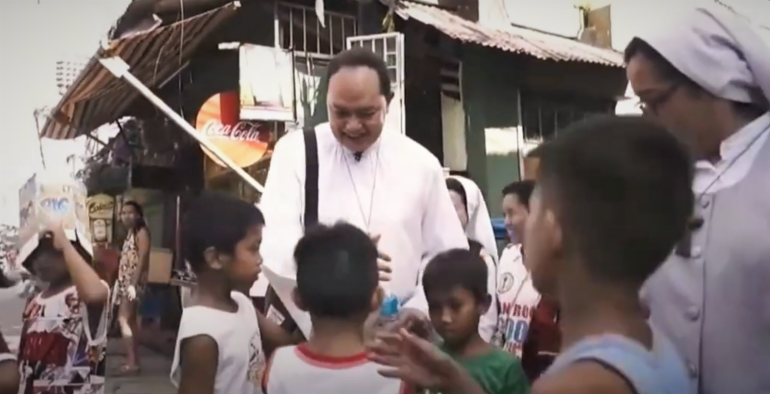
Kasmir Nema: Bishop, you know, the FABC is famous for this triple dialogue: dialogue with religion, dialogue with culture, and dialogue with the poor. I guess my question is: how do both your diocese and also the CBCP engage in dialogue with the poor, particularly in Manila and your diocese?
Bishop David:
Well, with regard to the three-fold dialogue, the ones that are most prominent, really are the dialogue with the poor as well as ecumenism and a very minimal amount of interreligious dialogue. Well, the interreligious dialogue part is mainly with the Chinese community, especially here in Kalookan, who are mainly Buddhists and Taoists as well. But they are very open to partnerships with the Church.
Now, with regard to Ecumenism, one of our cities here is Malabon, which was the original birthplace, of what we call the Iglecia Philippines Independente or the Philippines Independent Church. It was a product of historical circumstances that after the revolution, by the end of the 19th century, because of the conflict with the colonial government, which was so equated with the Roman Catholic Church, there were some Catholics who broke off from the Roman Catholic Church and established an independent church, quite like the Anglicans, you know, Independent Church, but still basically Catholic in traditions.
Introduction so we have them in Malabon City, and we have very experience of the synodality, thanks to the synod of the synodality. We've been forced by circumstances to take our ecumenical relationship with fellow Christians who are not necessarily Catholics, but the most prominent, like I said, is the dialogue with the poor. And it was mainly for that reason that I established what I call mission stations. I told you a while ago about mission stations. The mission stations are our effort to make the Church more present among the poorest of the poor because I realized that there was some kind of a gap; a gap between our traditional parishes and the urban poor communities of our diocese. And much of that is also cultural. Yeah, because our traditional parishes are composed mainly of locals, you know, and residents, like the original residence of Malabon, the original residence of Navotas, and the original residence of Kalookan. But if I said we have around 1.5 million people here. I am sure around the 19th century, there may have been only around 100,000 people here.
But the influx of local migrants has made our communities balloon into huge, huge urban poor communities. People in search of jobs in the metropolis. So, you can imagine that there is no shared culture, there's no shared ethnicity. People would call us Filipinos, but they forget that we're actually coming from different cultural traditions and different ethnicities. I'm not even a Tagalog. I am a campaangan. I had to learn Tagalog because that was not the language of my province, our region. And it goes the same way with the Visayas, Ilonggos, Ilocanos, and Cebuanos, and these people have their own strong cultural identities. Now, many of them have been uprooted from the regions, from the provinces because of their quest for jobs, for economic reasons.
So, imagine them finding themselves suddenly settling in a huge metropolis like strangers. So sometimes people think only of foreign migration, that people become strangers when they go abroad. No, right here in our country, there are many strangers. So, imagine if the original residents were only about 100,000, and suddenly you have more than a million settling around here, living like urban poor communities, especially in slum communities, as informal settlers. The interaction among them would not be always positive, and would not be always productive. And so, I have had to bridge the gaps. And you see that's part of the dialogue that you're talking about.
Kasmir Nema: You made very interesting terminologies on the present setting of Christianity in the Philippines. If I'm not mistaken, you said post-colonial and post-Conciliar settings. Can you explain to us what these two terms mean? And perhaps the most important thing is, What is the implication of these two settings for Christianity in the Philippines?
Bishop David:
Yeah, very profound implications now that we're talking of a post-colonial Philippine church. First of all, when you talk of the Catholic bishops of the Philippines, you're talking of mainly Filipino Catholic bishops. And believe it or not, during the colonial times, there was not a single Filipino bishop. No, they did not ordain a single Filipino bishop during the colonial times.
It was not until after the revolution that there was one Filipino ordained, I think in 1904, or 1907 the already that, late already, and the religious orders were not admitting natives into their congregations, and the native clergy, especially the diocesan clergy, were not allowed to handle parishes.
It was like that in colonial times. And so, there was really something very radically different that took place in the post-colonial setting. I'm not saying this to say that I have resentments against the colonial period. Of course, these were the historical circumstances in which Christianity came to the Philippines. But when we say post-colonial, we're talking about a radically different Philippine church altogether. And that goes for the bishops. It goes also for the clergy. It goes for the religious as well. We do have religious congregations.
We do have foreign missionaries still present, but I would say the majority of the people really in charge of the mission here in the Philippines are already native Filipinos, with a lot of help also from religious congregations.
Now, when we talk of post-conciliar, I'm talking of two things here, the Second Vatican Council and the preliminary Council, Philippines. So, I'm talking about a global council and a local Philippine church council.
And in this post-conciliar setting, we're talking about the profound impact of the second reform of the church in the Second Vatican Council. And, yeah, it's different altogether. And for me, Pope Francis has been one of the big blessings of the Catholic Church because he really pursued the reform of the Church in the Second Vatican Council. And I could only attribute his thoughts about synodality and his efforts to emphasize the aspects of communion, participation, and mission to his rootedness in the Second Vatican Council.
Kasmir Nema: You are one of the few Catholic figures in the Philippines who have lots of social media followers. If I'm not mistaken, your Facebook followers’ number more than 50,000 people. In the diocese, followers are more than nearly 70,000 people. Looking at these figures, Bishop, how do these figures say to you in relation to your mission?
Bishop David:
Well, I was forced by circumstances, really, to be present on social media. First of all, I'm not a techie. I'm not a digital native. I got introduced quite late to digital technology and the use of the social media. But I felt that we really had to be present on social media. At the start, I felt intimidated by social media because you don't know whom you are reaching out there, and there is so much negativity on social media, a lot of misinformation, and a lot of bullying. And for a while, I thought maybe it wasn't worth being present there. But when I realized that most people were there, present on social media, I said, oh, my goodness, we will lose by default, and we cannot allow that to happen.
And so, I was forced, really, by circumstances, and I was blessed that even before the pandemic struck, we were already able to establish our social communications ministry. But it was precisely when I realized during the pandemic that people were following our Eucharistic celebrations, activities, recollections, and retreats. I said, my goodness, this is a perfect opportunity to evangelize. And so, I encourage the clergy to do it also. Let us be there. Let's allow people to have access to the Word of God. It's not about building your personal fame or popularity. It's about making the Word of God accessible to people.
What really motivated me was when I started hearing the stories of our followers, whom we don't even know personally. Of course, we have followers, local followers, down here, but some of them would just drop by the church, and they say they come from another place somewhere. Sometimes they are vacationing from some other place, or they would email, or they would contact you through Viber or messenger, and they would say, we're following you from Dubai, from Qatar, from Saudi Arabia, from Australia, New Zealand, Japan, wherever.
And I said, oh, my goodness, this is really the power of digital technology. And if the Word of God can use digital technology as a platform for evangelization, why not? Why not? It's an instrument. Let us use it.
But I was also aware of my own limitations like you're saying, 50,000 followers, but I am quite aware that most of those followers are relatively old followers. I doubt if I am really able to reach most young people who are on TikTok and Instagram and we're not there.
That is why I encourage our clergy, the younger clergy. I said I will provide the content for you through my homily’s retreats, and recollections, and it's up to you to pick up. Don't mind plagiarizing. Don't mind picking up or picking up ideas from me. I said, there is no patent, no copyright for the word of God. You are free to use it and proclaim it. It's not my personal word. I said once I proclaim it, it's for public consumption. I said, now, if what I am saying, which might be articulate mainly to the elderly, relatively mature audience, can you make it much simpler and accessible to young people? So translated into many languages that can reach as many people as possible.
Radio Veritas Asia (RVA), a media platform of the Catholic Church, aims to share Christ. RVA started in 1969 as a continental Catholic radio station to serve Asian countries in their respective local language, thus earning the tag “the Voice of Asian Christianity.” Responding to the emerging context, RVA embraced media platforms to connect with the global Asian audience via its 21 language websites and various social media platforms.










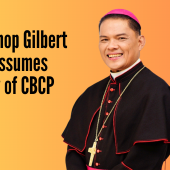
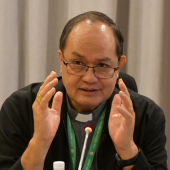
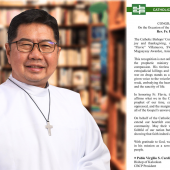



- Reply
Permalink